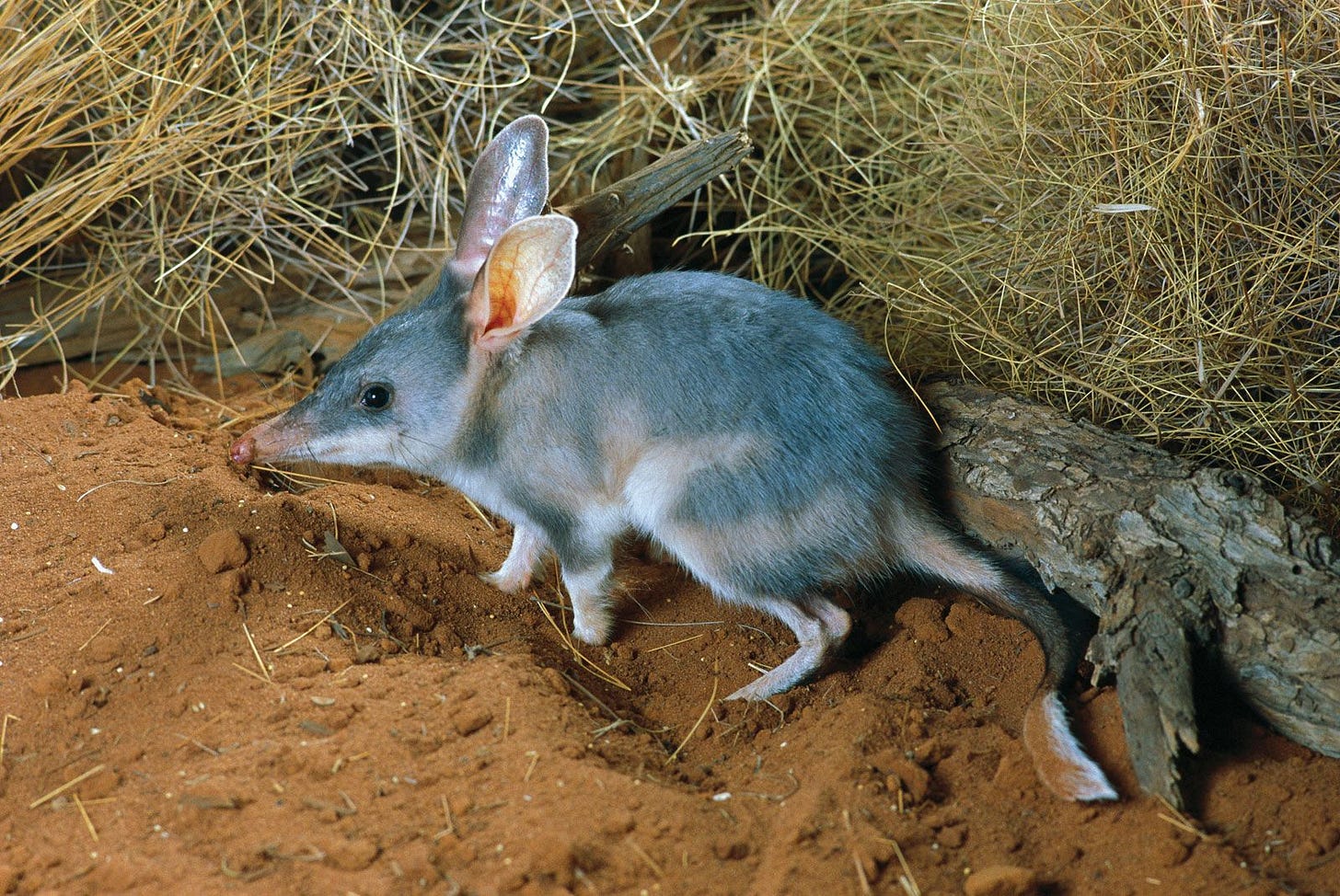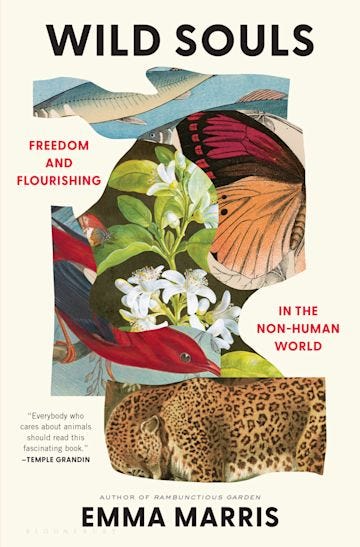News from a Changing Planet -- #30--Interview with Emma Marris
Something new and different! A conversation with one of my favorite writers.
Today’s installment is very exciting: an account of my conversation with Emma Maris, mostly about her most recent book, Wild Souls: Freedom and Flourishing in the Non-Human World (which just came out in paperback on 3/21! Buy buy buy!).
[As a side note, I will be adding a paid subscription option next month. More information to come! And if you haven’t already, don’t forget to read about my hero’s quest in Outside magazine!)
I have been an admirer of hers since reading her first book, Rambunctious Garden: Saving Nature in a Post-Wild World,* which is about how people should care for and relate to the world around them in an age of accelerated and widespread human influence on every corner of the planet.
I recently read Wild Souls, which is deeply-felt moral philosophy disguised as narrative non-fiction and science journalism. It’s about the relationship between people and animals, and what we owe them now that we have made their existence more precarious and their future more uncertain.
She writes about introduced species, those on the brink of extinction and whether and how we “save” them, zoos, exotic animal ownership, and much more. After reading her first book, especially, but also this one, I’ve found that her ideas have become so important to how I think about the world that it’s hard to remember not thinking this way.

We spoke about her books, why environmental ethics and philosophy are important, the artificial constructions of “wilderness,” “nature” and even “species,” and how clinging to them can hold us back from creating a positive relationship with the planet. (Another great thing to read on this topic: “The Trouble with Wilderness; or, Getting Back to the Wrong Nature” by William Cronon, one of my favorite historians.)
How do you manage to get through the day, basically, when you are taking such care to think about how we ought to relate to the other beings that share our environments?
I think one of the reasons I wrote the book was I kept feeling like these decisions about how to conserve the nonhuman world are being made by people who aren’t taking into consideration all of the factors, but when you start trying to bring in all of the factors, it becomes very overwhelming.
By writing the book, I was hoping I would be able to get to the marrow of the value of what we call nature in a way that would help me with that feeling of being overwhelmed.
But any attempt to reduce it past a certain point would be inaccurate. You can only simplify these questions so far - you can’t really simplify them further. They remain really knotty and complicated.

I felt reading your book is that the actual process itself — of thinking through these knotty questions and having an ethical system to help answer them— is the solution. How or why did you decide to wrestle with these questions and to create a moral framework for answering them?
In my first book, I really tried to pick apart our understanding of wilderness, wildness, and nature, and I found some of these concepts to be problematic and leading us to poor decisions. This framework that a lot of us grew up with — that North America was a virgin wilderness when Europeans showed up — is just not the case.
Indigenous people were managing the land in a very intentional and comprehensive way, but for decades conservation was premised on the idea that they had little effect on their environment. Writing about that put me in the mindset of always looking for the hidden assumptions in environmental decision-making or policy.
One topic that I followed for a long time is introduced species, and the “invasive species paradigm” springs from the same suite of assumptions: that humans are not part of nature and everything we do by definition reduces the naturalness of whatever we touch. That human/nature dichotomy is at the root of a lot of problematic ideas in conservation.

But even if you put humans back into Nature, which tends to knock “naturalness” and “wilderness” off your list of top values in nature there are still some important values that can conflict. People who are animal lovers are often environmentalists, but sometimes environmentalists kill a bunch of animals to save others. Hundreds of thousands of introduced animals like rats, mice, cats, and foxes are killed each year by conservationists. I wanted to figure that out. Is there a way to reconcile the value of individual sentient animals and the value of biodiversity?
One of my favorite parts of the book was when you described all the different amazing things animals can do that display an intelligence or ability that we think of as being reserved for humans — using tools, helping each other, counting, communicating, grieving, laughing (rats laugh and like to be tickled!), remembering, making plans, and more.
There are a bunch of different ways that ethicists have tried to make the rules about who counts morally, like only creatures that can suffer or feel pain count. Well, did you know fish feel pain actually?
In some way, that part of the book is a response to the rules that they set out. Nathanael Johnson, who wrote Unseen City: The Majesty of Pigeons, the Discreet Charm of Snails & Other Wonders of the Urban Wilderness, wrote about how squirrels probably think that we are super dumbasses because we can’t remember where we put thousands of nuts like they can. That always kind of stuck with me: if they were judging us, we would also fall short of some of the capabilities that they show that are important to how they live and survive.

I loved this — especially the parts about how rats would save each other rather than eat chocolate chips, which made my heart swell! But I also feel that animals shouldn’t have to act in ways that we appreciate for us to value them — we should be able to value them regardless of their capabilities.
We’re probably capable of getting there eventually. We have a sense that people are all valuable: everyone is 100 percent morally valuable regardless of their SAT scores. But it’s complicated too: when we get to the place where all creatures are morally valuable, how do we live?
There’s no getting around the fact that existence on this planet has ripple effects, and it’s uncomfortable for us to recognize that all of these other organisms have goals and plans and worth. There is no way of existing without sometimes ruining their plans. I’m not even just talking about eating meat here. We build our houses in animal habitat; we kill or relocate animals who eat our crops or enter our homes; every road or even hiking trail we build changes thousands of animal lives. We want to be ethically perfect, and if the facts about the rest of the world make it so that our existence can’t be ethically perfect, then we don’t want to hear those facts.
We’ve always had to figure out what our relationships with other species are - that’s not a new thing. The idea that we don’t have to have relationships with other species is the real weird modern idea. North American environmentalism has traditionally been based on the idea that we can have no impact, but that’s not how we work as animals. Figuring out how to have good relationships is a much older idea and more workable idea.
I was recently reporting a story about acoustic whale monitoring in the New York Bight, and it turns out that what we thought the North Atlantic Right Whale was doing, is not what it does, and it was incredible to me that these creatures are so big, there are so few of them, and we still don’t know what they do and where they are.
Whenever I find out that animals are up to something we didn’t know about, it makes me happy because it speaks to our sense that they deserve autonomy and they deserve this freedom. Humans and other organisms are all entangled and we can’t be apart from nature, so it’s worth carefully distinguishing between these entangled relationships which are inevitable and our ability to let other animals have autonomy within these relationships, and there is a difference between relationships and control.

If we’re thinking about control, how should we think about these situations where we have to exact enormous control over an animal’s or species’ lives in order to keep them from going extinct?
This is probably one of the things that I continue to struggle with the most. I still really find extinction to be disgusting and bad, and yet sometimes the things that we would have to do to prevent an extinction are intense and could be violent. Are all extinctions equal?
I think that if you asked me 10 years ago, “is there any situation where the ethical thing to do is to allow a species to go extinct?” I would have said absolutely not. But now I think there could be a situation where the price of keeping a species alive is too high in pain and suffering. That’s an uncomfortable feeling for me.
If you are trying to make a decision about how to do things, one helpful thing to keep in mind is, what choice will leave the most options open in the future? I disagree with Aldo Leopold on some things, but I think his principle — “To keep every cog and wheel is the first precaution of intelligent tinkering” — is a sound one.
*Thank you, Willie Fix, for this recommendation!
I hope you enjoyed this conversation with Emma Marris. I loved having it! Please let me know if there are other dream interview guests and I’ll see what I can do!
Tatiana




